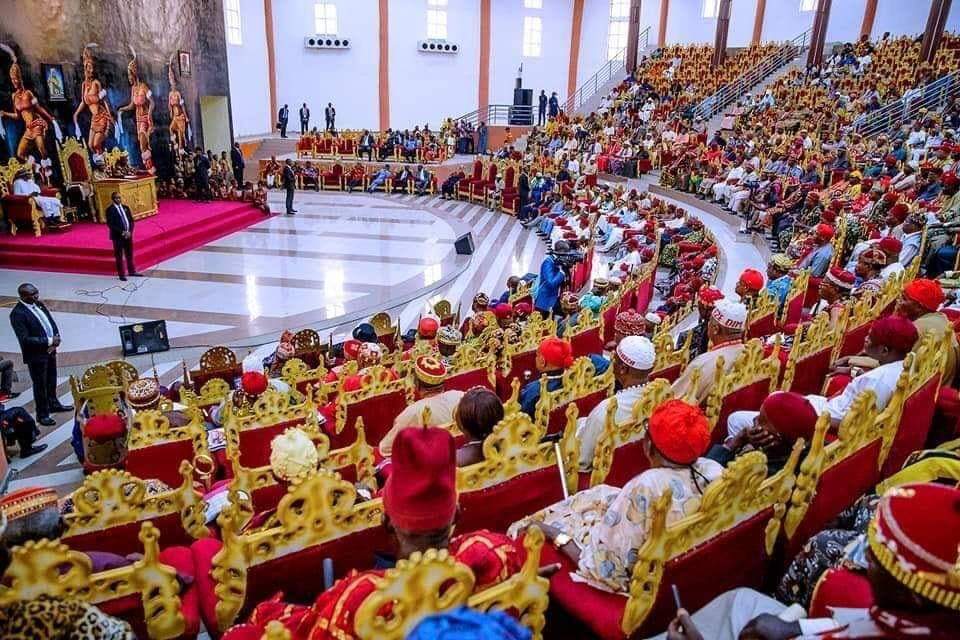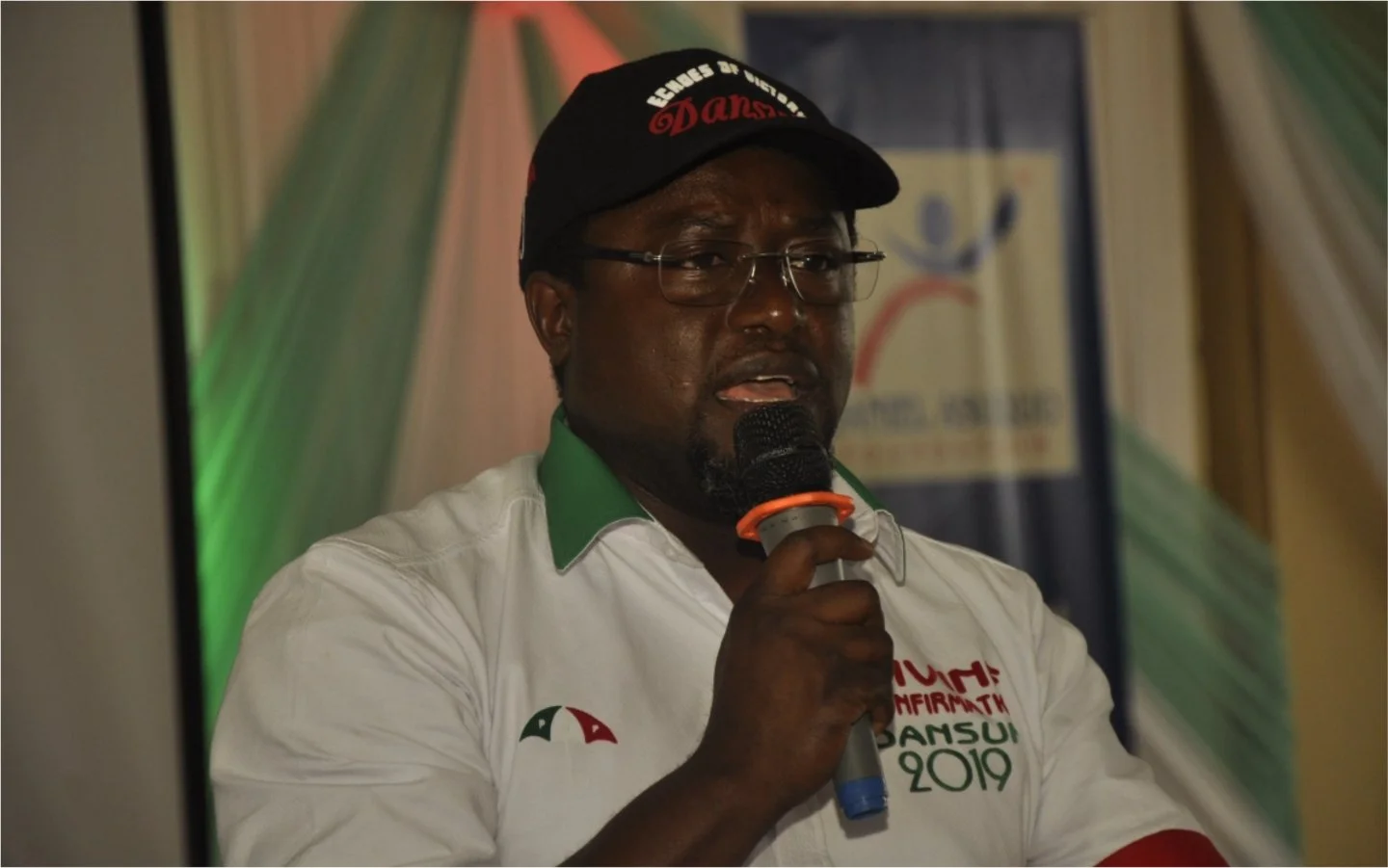The controversy surrounding the purported dissolution of the Imo State Traditional Rulers’ Council is deepening by the day. CHIDIEBUBE OKEOMA writes on the issues in contention
There is confusion on who is the rightful Chairman of the Imo Traditional Rulers’ Council. Weeks ago, the Chief Press Secretary to Governor Hope Uzodinma, Oguwike Nwachuku, had issued a statement announcing that the Governor had dissolved the leadership of the state traditional rulers council headed by Eze Samuel Ohiri, Obi 1 of Obi Orodo autonomous community, in the Mbaitoli Local Government Area of the state.
The statement said the governor announced the dissolution of the leadership of the council during a meeting he had with the monarchs at their state secretariat in Owerri.
But in a swift reaction, Ohiri said the governor had not dissolved the council headed by him. The monarch insisted that the governor never announced any dissolution during a meeting he had with them. Describing the announcement by the governor’s spokesperson as fallacy, Ohiri said Nwachuku was not in Uzodinma’s entourage on the day the governor met with the traditional rulers.
Ohiri said he had reached out to the governor’s spokesperson to inquire how he got the information that the leadership of the state traditional rulers’ council had been dissolved. The monarch said that Nwachuku told him that it was the state Commissioner for Information and Strategy, Declan Emelumba, who told him that the governor announced the dissolution of the council during the meeting.
Ohiri, who cited the relevant sections of the law establishing the state traditional rulers’ council, said having been re-elected by his colleagues in 2018, his five-year tenure would lapse in 2023.
He said the governor never dissolved the council and that the law establishing it did not permit unilateral dissolution, adding that every action taken by the council was backed by the law.
The Obi of Orodo, who said that he remained the chairman of the council, added that the news about the dissolution was sponsored by mischief-makers.
The traditional ruler said he did not believe that the governor sanctioned the statement.
He explained that the governor never mentioned any issue related to the dissolution of the body while addressing the members at their secretariat in Owerri.
Ohiri noted that the reaction was imperative to erase the erroneous impression, because he was shocked to read that Uzodinma dissolved the council’s leadership shortly after he left the secretariat.
He said the governor, knowing that such an issue might arise from the meeting, told them, “I did not come here to dissolve the council, rather to address some pressing issues like COVID-19 and its solution as well as to synergise on how to achieve robust community policing,” adding that at no point during the discussion did Uzodinma said he had dissolved the traditional rulers’ council.
Ohiri stated, “When I got the statement, I called the Commissioner for Information, Declan Emelumba, to confirm if he was aware of the news. He told me yes, that after the governor’s address to Ndi-Eze, some journalists met him outside, where he told them that there was no need for constituting a new council when one was already in place. The commissioner now said from the governor’s response, he inferred that he meant dissolution.
“How can you authorise a government press statement by inference when the governor has not spoken. It’s very unfortunate and we the traditional rulers have rejected the news until the governor gives us further directives.”
He explained that the Imo State Traditional Council Law No. 15 of 2016, which brought him into office, stipulated a five-year tenure, which would end in 2023 as he was elected in June 2018.
He admitted that though the law had been amended to limit the tenure to two years and that the governor could now appoint a chairman, “but the law cannot be implemented immediately. It is understandable that the new law takes effect from the next tenure in order not to alter the process.”
“Any way, if Uzodinma is privy to the purported press release, I will gladly hand over to the appropriate designated person as directed by the governor and go back to my business,” Ohiri said.
The monarch seized the opportunity to inform his colleagues that the repeal of the Community Government Council Law was not for the current leadership of the traditional council, because it was not appointed but elected for a tenure of five years and had just spent two years.
He assured his fellow monarchs that the council was still intact and had resolved to support the community policing initiative of the governor, describing it as a well thought out programme aimed at eliminating crimes.
But the state government insisted that the governor dissolved the leadership of the state traditional rulers’ council.
The governor’s spokesperson, who spoke to our correspondent, said that Uzodinma was “reconstituting the council.”
Nwachuku said, “There is no controversy as long as this issue is concerned. The leadership of the state traditional rulers’ council was dissolved by the governor. He is reconstituting it for a better outcome.”
But the traditional rulers are divided on the contentious issue of the dissolution of the leadership of their council by the governor. While some are in support of the reported dissolution, others say the council is not an appendage of the governor.
Traditional rulers, who support the alleged removal of Ohiri, say what goes round, comes round. They insist that Ohiri is a product of executive recklessness when in 2011, the then governor, Rochas Okorocha, sacked the chairman of the state traditional rulers’ council, Cletus Ilomuanya, whose tenure was remaining two years and replaced him with Ohiri.
One of the traditional rulers, who supported the dissolution of the council and spoke on condition of anonymity, said, “Ohiri is a product of imposition and executive recklessness by Rochas Okorocha.
“You remember that in 2011, on assumption of office, Okorocha imposed Ohiri on us and removed our duly elected chairman. Okorocha, who had scores to settle with Ilomuanya, overlooked all known conventions and the law establishing the state traditional rulers’ council and imposed Ohiri on us. Why is he now crying foul? Has he forgotten that what goes round comes round?
“Moreover, is the chairmanship position of the council the birth right of Eze Samuel Ohiri? He has been the chairman of the state traditional rulers’ council for nine years now. Does he want to stay there till eternity? He should obey the executive order, which removed him so that there will be fresh air in the council.”
Another traditional ruler, who is pro-Ohiri, argued that the governor did not have the power, whether constitutionally or conventionally, to dissolve the elected leadership of the council.
The monarch said, “The traditional rulers have no interest in politics; therefore, our institution should not be allowed to be politicised. This council headed by Eze Samuel Ohiri was duly elected in accordance with the law establishing the Imo State Traditional Rulers’ Council. This leadership was elected in June 2018 for a five-year tenure, which will elapse in June 2023. Nothing should truncate the tenure.
“We do not want bad precedence to perverse the atmosphere of our traditional rulers’ council. As custodians of the sacred culture of the Igbo people, we need peace, justice and smooth leadership to effectively function in our respective communities.”
It will be recalled that there are several court judgments, including the Supreme Court verdict, mandating the then governor, Okorocha, to allow Ilomuanya to serve out his tenure as the state chairman of the traditional rulers’ council, but ignored all of them.
As a way of humiliating Ilomuanya, the ex-governor deposed him and crowned another person as the traditional ruler of the Obinukwu autonomous community. Sources close to Okorocha said he was angry with Ilomuanya for working against his emergence in 2011 as the governor of the state.
The sources said instead of maintaining neutrality, Ilomuanya “openly” campaigned for the re-election of Ikedi Ohakim, who was the then governor of the state.
It was in 2019, when Emeka Ihedioha emerged as the governor that Ilomuanya was returned as a traditional ruler by the state government.
Two persons, who spoke to our correspondent, said that Uzodinma should recall Eze Ilomuanya to serve out his tenure, which the Okorocha administration truncated.
Kingsley Madu said, “The best thing to do is to return Eze Ilomuanya to serve out his tenure. You remembered that because of political vendetta, Okorocha unlawfully removed Ilomuanya as the chairman of the state traditional rulers’ council.
“That was pure disobedience of the constitution. So, if I am to suggest, I will tell the governor to bring Ilomuanya to serve out his tenure as the chairman of the council. It is just, it is constitutional and commendable.”
A source told our correspondent that Uzodinma might name his in-law, Eze E. C. Okeke of Orlu, as the next chairman of the traditional rulers’ council.
As the game unfolds, Imo people are patiently expecting the governor to do what is right in the best interest of the traditional institution in the state.
PUNCH







2 Comments